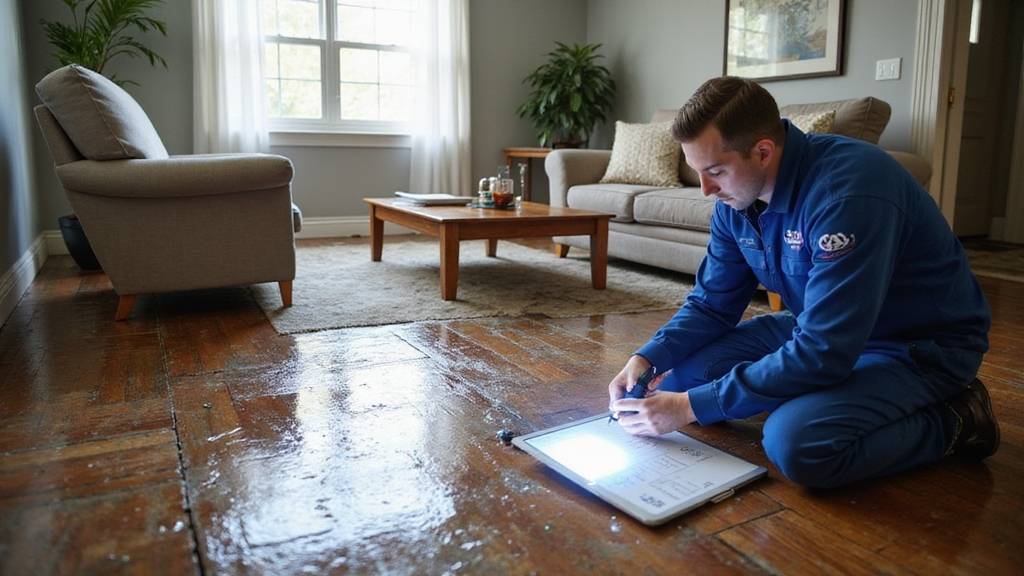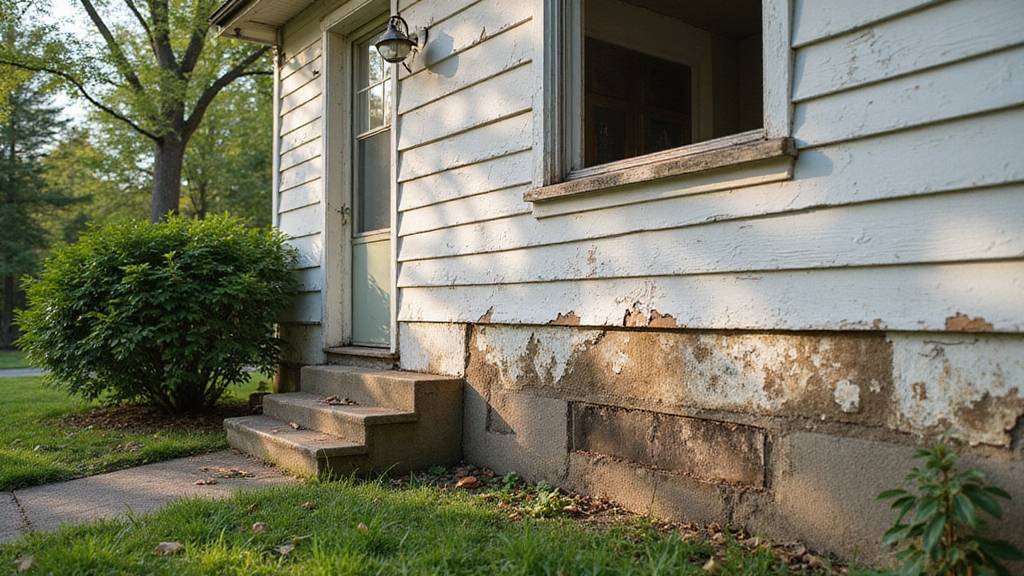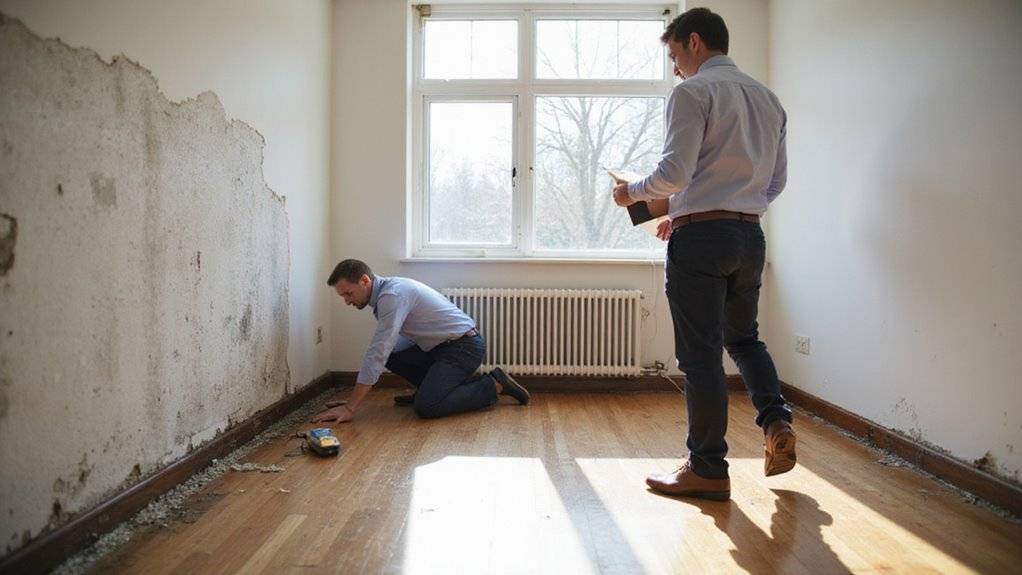Water damage can make selling your house feel impossible. The stains, odors, and repairs can scare away even serious buyers. Most homeowners worry the damage will cause delays and lower offers.
The truth is, water damage creates trust issues. Buyers fear hidden problems and expensive repairs. You might feel stuck with a property no one wants to touch.
But you can sell a house with water damage fast if you use the right approach. The best strategies focus on honesty, smart repairs, and targeting the right buyers. This blog will guide you step by step so you can solve this challenge quickly.
Key Takeaways
- Disclose all water damage and repairs transparently to build trust and comply with legal requirements.
- Prioritize structural repairs and professional mold remediation to address buyer concerns and health risks.
- Price the house competitively, factoring in repair costs and local market comparisons for damaged properties.
- Market the property “as-is” to attract cash buyers and investors seeking renovation opportunities for quick closings.
- Work with experienced real estate agents and water damage specialists to streamline repairs, disclosures, and negotiations.
Assessing the Extent of Water Damage

Assessing the extent of water damage is important before selling your house. You should check all areas where leaks may occur. These include basements, attics, crawl spaces, and under sinks. Check basements, attics, crawl spaces, and under sinks for leaks to assess water damage before putting your house on the market.
Look for signs such as stains, peeling paint, or musty smells. Warped floors and ceiling marks can also show water problems. If you notice any of these, further inspection is needed.
Identify the source of the water issue if possible. Fix leaky roofs, plumbing problems, or poor drainage right away. This helps prevent more damage and extra repair costs.
Mold is a serious risk if water damage is left untreated. Remediate any mold quickly, as it can affect health and scare buyers. If you address mold, buyers will feel more confident.
You should document all damage and repairs. Good records show honesty and help answer buyers’ questions. If you provide this information, negotiations may be easier.
Proper assessment and documentation can also help you sell your house quickly and confidently, especially if you choose to sell to local experts who handle all repairs and paperwork. Understanding the extent of water damage can also guide your decision on whether to repair the issues beforehand or sell as-is to a buyer who buys houses in any condition.
Conducting a Professional Inspection
A professional inspection gives a clear and unbiased look at water damage. Inspectors find problems you may not notice yourself. Their expertise ensures nothing important gets missed.
Inspectors use special tools to check for hidden moisture and mold. They also look for structural damage that is not easy to see. If you want a complete assessment, hiring a professional is the best way.
The inspector’s report details all issues and needed repairs. This report helps you talk with buyers and answer their questions. Buyers trust homes that come with honest and accurate inspection reports.
If you invest in a professional inspection, you show you are a responsible seller. This can help avoid surprises later and make the sale process smoother. Your home may even sell faster if buyers feel confident about its condition.
Understanding the costs of water damage repairs can help you set realistic expectations and pricing strategies for your property.
Disclosing Water Damage to Buyers

You need to follow legal disclosure requirements when selling a home with water damage, or you risk serious consequences. Being upfront with buyers builds trust and shows you’re a transparent seller. Honest disclosure can also shape negotiations, so it’s smart to know how this information affects your bottom line.
Disclosing all known issues, including water damage, helps you comply with state disclosure laws and reduces the risk of legal liability later. Additionally, understanding how market challenges impact your sale can help you navigate disclosure more effectively and avoid potential legal complications.
Legal Disclosure Requirements
State laws usually require you to tell buyers about water damage when selling a house. You must share any known leaks, water issues, or mold. If you hide these problems, you could face legal trouble.
If you have repaired water damage, keep records of the work and any insurance claims. Complete all required disclosure forms honestly and completely. Consult a real estate agent or lawyer to learn about your state’s rules.
If you disclose issues early, you reduce your risk of lawsuits or penalties. Proper disclosure also helps prevent the sale from being canceled later. Buyers appreciate clear and honest information.
Building Buyer Trust
Being honest about your property helps buyers trust you. If you disclose water damage early, buyers feel confident moving forward. Trust grows when buyers know what to expect.
Sellers should address problems directly and share all repairs made. Providing receipts and documents proves you fixed issues the right way. This makes buyers more comfortable with their decision.
Professional staging can show your home at its best. If repairs are done, highlight these improvements during showings. Buyers value honesty and clear information when choosing a home.
If you are open and proactive, your property stands out from others. Buyers will remember your honesty and may feel more willing to make an offer. Trust is a key advantage in any real estate market.
Impact on Negotiations
Disclosure of water damage can shape negotiations in a positive way. Being honest about the issue builds trust with buyers. It also prevents unexpected problems during the sale.
If you disclose the damage, buyers may ask for a lower price. Your honesty, however, lets you explain your price and show proof of repairs. You could also offer a warranty to make buyers feel more comfortable.
Open discussion about flood zones and insurance helps buyers make informed choices. This reduces the risk of problems later in the process. If you are upfront, buyers are less likely to back out at the last minute.
Repairing Critical Structural Issues

You need to spot structural weaknesses as soon as possible, since buyers will notice them during inspections. Focus on repairing the most critical issues first—like foundation cracks or compromised support beams—to maintain your home’s value and attract serious offers.
Quick, targeted fixes can make your property far more appealing in a competitive market. If you’re unsure about the extent of damage, consulting a trusted local professional can help identify structural issues that need immediate attention. Additionally, understanding the legal considerations involved in property repairs ensures you comply with local regulations and avoid future complications.
Identifying Structural Weaknesses Early
Before listing a house with water damage, check for structural weaknesses right away. Early detection helps protect your investment and reduces buyer concerns. If you find issues early, you can fix them before selling.
Inspect the foundation for cracks, movement, or damp spots. These signs can mean the foundation is not stable. If you notice such problems, address them immediately.
Examine the roof for missing shingles, sagging, or leaks. Roof problems can worry buyers and hurt your sale. Fix any roof issues before showing the house.
Look for warped floors or damp walls, as these often mean water has damaged the structure. If you see these signs, consider repairs. Early action can help your property sell faster and at a better price.
Prioritizing Essential Repairs
Essential repairs should focus on safety and the structure of the home. Address issues with the foundation, support beams, and load-bearing walls first. If these areas are damaged, buyers may not trust the house.
Water mitigation comes before cosmetic repairs. Repair any leaks, fix drainage problems, and make sure the property is dry. If you solve these problems, you protect the house from future damage.
Structural stability should be restored before making the home look better. Avoid spending money on surface fixes until the main issues are solved. Buyers gain confidence when they see real repairs, not just fresh paint.
A proactive approach to repairs can make your home stand out. If you show you fixed the big problems, buyers see more value. This can also help you avoid tough negotiations later.
Addressing Mold and Odor Problems
Mold and odors can lower your home’s value and scare away buyers. If you want to sell quickly, you must fix these issues. Mold and bad smells should be handled as soon as possible. Mold and unpleasant odors drive buyers away and hurt your home’s value, so address these issues quickly if you want a fast sale.
A certified professional should inspect your home for hidden mold. If they find mold, get full remediation, not just surface cleaning. Mold behind walls and under floors often goes unnoticed.
Odors can linger even after cleaning. If the smell stays, use professional odor removal services. Ozone treatments or air scrubbers can help remove musty smells.
If you fix mold and odor problems, keep all documentation. Buyers will want proof that the issues were addressed. Showing these records can help you close the sale faster. Additionally, addressing water damage and dampness early can prevent further deterioration and improve your chances of a quick sale foundation issues.
Cleaning and Staging the Property
Cleaning and staging the property helps it look its best for buyers. Start by cleaning every area, especially those affected by water. Remove all dust, debris, and water stains to make the home look fresh.
If the home is clean, buyers will see it as well cared for. Rearrange furniture to make rooms feel spacious and inviting. Use bright lights to improve the look of each space.
Add simple decorations, fresh linens, and light scents if possible. Neutral colors help buyers imagine their own style in the home. Good cleaning and staging can help your house stand out and attract serious offers. Effortless Escrow Support ensures a smooth closing process that can help you sell quickly.
Pricing Your Home Competitively
Setting a competitive price is crucial when selling a house with water damage. Buyers expect a discount because of repair needs. A fair price attracts more serious offers.
Research recent home sales in your area. Compare your property to others, especially those with similar damage. If your home stands out, adjust the price to reflect its true condition. Knowing the local market dynamics and how water damage impacts value can help you set a more accurate price.
Always subtract realistic repair costs from your asking price. Buyers will notice transparency and may trust your offer more. If costs seem high, be ready to explain your reasoning.
Consult a real estate agent who knows your neighborhood. Professional advice can help you set an appealing price. A smart price can help your home sell faster.
Additionally, understanding the co-ownership structure and any legal considerations can be vital if co-owners are involved in the sale. Being aware of the property valuation process and how damage affects it can also aid in negotiations.
Highlighting the Property’s Potential
Your property still has potential, even with water damage. Buyers may be interested in features like location, lot size, or unique design. If the home is easy to renovate, it can be a good investment. A fast, effortless process can also help you sell your water-damaged house quickly and with less stress. Be honest about the water damage and any mold issues. If you have repair quotes, share them with buyers.
This helps buyers understand the costs and plan for improvements. You should also point out any new systems or updates in the house. If some parts are untouched by damage, highlight these features. Buyers may see these as valuable and worth restoring. Highlighting property potential can attract serious buyers who look past current problems and recognize future value. Many people look past current problems and see future value. A clear and honest presentation may help you get better offers.
Marketing Directly to Real Estate Investors
Focus your efforts on real estate investors by targeting cash buyers who are ready to move quickly. Emphasize the property’s investment potential and position the repairs as an opportunity for added value. By streamlining the closing process, you’ll attract serious buyers and expedite your sale. Highlight the benefits of working with trusted, local cash home buyers like Freedom Path Investors, who understand the local real estate market and can close quickly to meet your timeline.
Targeting Cash Buyers Only
The best way to sell a house with water damage fast is to target cash buyers. Cash buyers are experienced with homes that need repairs. They can buy quickly and do not need traditional loans.
You should list your property on local investor networks. These networks are full of buyers looking for homes to fix. Investors usually search for houses with visible issues.
If you show the home’s renovation potential, you might get more interest. Cash buyers want properties where they can add value. Highlight any features that could be improved after repairs.
If your home could become more energy efficient after renovations, mention this to buyers. Many investors consider future savings when making offers. This could make your property more attractive.
Highlighting Investment Potential
Investors often see water-damaged homes as valuable projects. Water damage can lower the price, creating room for profit after repairs. If you want to attract investors, focus on this opportunity.
You should provide a clear water damage report and a recent structural check. These documents help investors understand repair costs and risks. Investors will feel more confident if you share all facts about the property.
Local market trends can increase a property’s value after renovation. If home prices are rising or rentals are in demand, mention these points. Investors look for numbers and growth potential, not just appearance.
Be honest about the property’s current state. If you show investors the possible profit, they may move forward. Investors value good information and clear opportunities.
Streamlining the Closing Process
Selling your water-damaged property to a real estate investor can make closing much faster. Investors know how to handle water issues and legal steps. This helps you avoid the slow process of selling the usual way.
If you choose an investor, you may get an offer in just a few days. Investors usually skip long inspections or waiting for bank loans. They understand disclosure rules and keep the paperwork simple.
Some investors can close on your timeline if you need to move quickly. You could finish the sale in as little as seven days. This speed can help you avoid extra costs and stress.
Selling to Cash Home Buyers
Selling to cash home buyers is often the fastest way to handle a home with water damage. These buyers are experienced with properties that need repairs. They can make the selling process simple and quick.
Cash buyers purchase homes “as-is,” so you do not need to fix water damage first. If you want to avoid long negotiations and bank delays, this option works well. They will usually skip detailed inspections.
If you get offers from several cash buyers, you can compare prices and terms. Choosing a reputable local buyer is important for a fair deal. You can save time and avoid extra costs by selling directly to them.
Leveraging “As-Is” Sale Options
Selling your home “as-is” means you do not have to fix water damage before selling. You avoid repairs and save time. Buyers will handle any needed work after purchase.
Some buyers are investors experienced with damaged homes. You should tell buyers about any past flood insurance claims. Sharing this information helps build trust and makes negotiations faster.
If you sell “as-is,” buyers take responsibility for future repairs. You will likely get lower offers than market value. The sale process can be much quicker.
Be sure to disclose all known water problems and insurance history. This helps you avoid legal issues later. Selling “as-is” is a good option if you cannot or do not want to make repairs.
Working With Experienced Real Estate Agents
Partner with a real estate agent who specializes in properties with water damage—they’ll know how to identify qualified buyers and connect you with trusted repair experts. You’ll need their guidance to navigate disclosure laws and present your home’s condition honestly while protecting your interests. Their local market insight ensures you price your property competitively and sell quickly, even with its challenges.
Identifying Water Damage Experts
Water damage experts help you handle the sale of a house with water problems. They know the challenges, legal steps, and repair needs. If you want a smoother sale, you should work with these professionals.
You should look for agents with certifications in water damage or proven experience in similar sales. These credentials show they understand what is needed. If an agent has handled water damage before, they are better prepared.
Local experts know the area’s common water issues and insurance claims. They also understand what buyers expect. This helps you set fair prices and avoid surprises.
A good expert has connections with inspectors and restoration companies. They can quickly arrange checks and repairs if needed. If you use their network, you save time.
Working with the right specialists gives you confidence. You can address buyer concerns and sell your house faster. If you follow these steps, your sale will go more smoothly.
Negotiating Disclosure Requirements
Disclosure is a key part of selling a house with water damage. You must tell buyers about any issues to follow the law. If you do not disclose, you risk legal problems and losing buyer trust.
Work with your real estate agent to decide how and when to share this information. An experienced agent can help you create clear and legal disclosures. If you need help, your agent can guide you on what documents to provide.
You should also include repair history, if available, to show the steps you have taken. Buyers may feel more comfortable if they see you have fixed past problems. If you are honest about repairs, you can speed up the sale.
Timing matters when you disclose information. If you share details early, you might build trust but lose some negotiation power. If you wait, you could move the deal faster but risk surprises during closing.
Leveraging Local Market Knowledge
Local market knowledge helps you sell a house with water damage. An experienced agent understands how local trends affect home values. This expertise is key when repairs are needed.
An agent can set a fair price by comparing similar homes. If you want to attract buyers who like renovation projects, they know how to market your home. Marketing will focus on your property’s strengths and its potential.
Agents use local trends to negotiate the best offers. If the market supports fixer-uppers, your agent will highlight this to buyers. Trust their knowledge if you want to sell fast and with confidence.
Negotiating Offers Effectively
Negotiating offers on a house with water damage requires a clear plan. Sellers should focus on getting the best possible deal, even with flaws. A strong negotiation can lead to better terms and a faster sale.
Start by pointing out the home’s positive features. If the house is staged or has quality virtual tours, mention these to buyers. These efforts help show your home in the best way, despite the damage.
If you receive an offer, respond quickly and professionally. Use facts, like recent sales in your area, to support your price. If buyers make a low offer, explain how your home still stands out.
Set clear expectations with buyers from the start. If needed, be open to reasonable repair credits or concessions. Staying flexible but firm helps you reach a good agreement.
Preparing for Appraisal and Closing
To prepare for the appraisal and closing, focus on clear communication and strong presentation. This helps buyers feel confident despite water damage. If you are organized, the process will be smoother.
Clear communication and strong presentation help buyers feel confident and make the appraisal and closing process smoother, even with water damage.
Sellers should always disclose all water damage and repairs to buyers and appraisers. Documentation like repair receipts and inspection reports is important. If buyers see these papers, they may feel more comfortable.
Staging can improve your home’s look even if there is damage. Use clean, simple décor and highlight the home’s best features. If you focus on undamaged areas, buyers will see the value.
Preparation builds trust and may speed up the sale. If you follow these steps, closing is often easier. Always keep all documents ready for review.
Conclusion
If you want to sell a house with water damage quickly, you must be open and complete essential repairs. If sellers provide honest disclosures, buyers feel more confident and are likely to act fast. If you price the home right and use an experienced agent, you can attract more interest and better offers.
If you need to avoid delays or hassles, cash buyers are a great option. If you work with cash buyers, you can often close much faster and skip repairs. If you are looking for a quick, no-stress solution, consider companies that buy houses for cash.
If you are ready to sell your house with water damage, we can help. If you want a fair cash offer and a smooth process, contact Freedom Path Investors. We are here to make your sale fast and easy.







